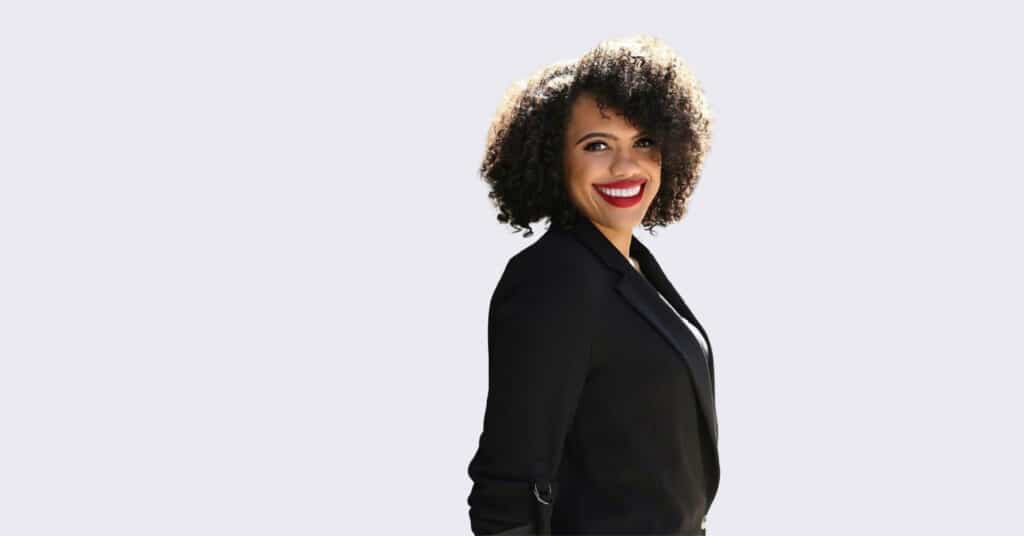Chloe Barnes – The corporate athlete #IWD2023

Chloe Barnes (she/her) is a Chicago-grown, former Division I Women’s Basketball player turned entrepreneur, facilitator, podcaster, and DE&I advocate whose world crashed when she was forced to retire from basketball prematurely due to injury. Determined to prevent other athletes from feeling the confusion that she felt after it was time to leave the game behind; after graduating with her MBA in 2014, Barnes began her career in collegiate player development, where she drove the creation and implementation of leadership academies, career combines, brand workshops, and civic service initiatives designed to provide student-athletes with the personal, professional and financial acumen they needed to thrive in life post sport.
What have sports meant to you?
Playing sports was the first thing as a young girl that I was ever good at. It gave me confidence when so many other aspects of growing up would have otherwise caused that confidence to go away. Sports made me realize that as a girl, it was okay to be powerful and it was okay to be strong. Sports made me realize that it was possible to have both grit AND grace, and just because I played a sport, didn’t mean that I had to choose one or the other. Sports gave me purpose and showed me that the world was much larger than I ever knew it could be. As the ultimate unifier, sports helped me make new connections despite cultural, socioeconomic, and language differences. Sports gave me the notion that I could do anything and was responsible for helping me build and sustain a 10+ year career working in sports and entertainment. Playing basketball as a young girl saved my life and I do my best to give back to the game anytime that I can.
What characteristics do you think female athletes possess that translate well to leadership in a corporate environment?
Female athletes possess so many traits that make them powerful leaders in the corporate world that it’s hard to pick just one. So if I have to name a few, I’d say that female athletes are intuitive, driven, competitive, analytical, compassionate, innovative, and have a will to win. Female athletes know what it’s like to make something out of nothing and they know what it’s like to succeed in the face of opposition. Female athletes know how to lead under pressure and know how to make big time plays when the team needs it most. Female athletes know how to lead with their voices and lead with their actions. Female athletes know when to shout, and know when something needs a whisper. But above all, female athletes are fearless and that (along with the other traits I mentioned) are what makes them great leaders in a corporate environment.
What lesson have you learned the hard way?
I’ve had to learn the hard way that asking for help doesn’t mean that I’m weak or that I don’t know what I’m doing. Acknowledging shortcomings or areas where I may need support are actually skills that promote vulnerability and increase trust between me and my teammates. When I’m transparent about the areas that I’m not as strong in, it provides other people on my team the ability to use their talents to help move us forward. After a few tough lessons, I now love surrounding myself in the corporate world with people who have different strengths than me. Iron sharpens iron.
What is the main lesson you have learned from the sporting world that has contributed to the success in your corporate life?
There are so many lessons that I’ve learned from sports that contribute to success in my corporate life but the lesson I reflect on most frequently is the need to align the right people with the right roles on any corporate team. Everyone on a sports‘ team has a role that they play and a role that is usually tailored to their strengths. When the team is at its best, every member of that team feels like they’re contributing, feels like their input is valuable, and feels like their unique skills and attributes are helping the team succeed.
When there’s misalignment on a team and productivity or efficiency falls short, it’s usually because:
- The team members were unclear about what their roles were
- The team members were unclear about how their roles and their contributions were helping the team succeed
- They were in a role that didn’t align with their natural skillset
I’ve learned from sports how to identify the strengths of my teammates and put them in positions to use their own talents to be successful and I’m so thankful that I’ve had the opportunity to learn that lesson.
Do you have a go-to quote that gives you inspiration in your sports and/or professional life?
Faith is taking the first step, even when you don’t see the whole staircase.
Dr. Martin Luther King
Please note that all commentary and opinions provided are those of the individual, and not the organization/company.


